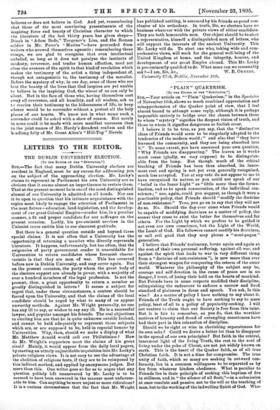" PLAIN " QUAKERISM.
f To THE EDITOR OY TRH " SPECTATOR:1 SIE,—Your article on "' Plain ' Quakerism," in the Spectator of November 1Gth, shows so much combined appreciation and misapprehension of the Quaker point of view, that I feel almost bound to attempt some reply, although it is perhaps impossible entirely to bridge over the chasm between those to whom " mystery " signifies the deepest vision of truth, and those to whom it signifies dangerous or foolish error.
I believe it to be true, as you say, that the "distinctive ideas of Friends would seem to be singularly adapted to the tendencies of the modern world;" and also that "they have leavened the community, and they are being absorbed into it." To some extent, you have answered your own question, "Why Friends are disappearing." The leaven as it worka must cease (gladly, we may suppose) to be distinguish- able from the lump. But though much of the ethical teaching of Friends has been thus absorbed, its inner- most root and spring is not yet even generally recognised, much less accepted. You at any rate do not appear to me to have recognised its nature, or you could not speak of our "belief in the Inner Light" as "little more than the formn- ligation, and so to speak consecration, of the individual con- science ; " nor, again,. could you suggest, as though it were a practicable policy, that Friends should "modify the doctrine of non-resistance." True, you go on to say that they will not do so. No. Should the day ever come when Friends would be capable of modifying doctrines as a matter of policy, the sooner they cease to exist the better for themselves and for others. For the Light by which we profess to be guided is not even our own conscience, but the Light of the World, the Lamb of God. His followers cannot modify his doctrines, or call evil good that they may please a "semi-pagan" generation.
I believe that Friends' testimony, borne again and again at, the coat of their own personal suffering, against all war, and against the spirit that leads to war (a very different thing from a "doctrine of non-resistance "), is now more than ever- their strongest weapon for conquering the esteem of the outer world. Whatever the philosophy of the subject may be, courage and self-devotion in the cause of peace are in no, danger, I trust, of losing their bold on the hearts of mankind. But Friends have in some respects modified their discipline, relinquishing the endeavour to enforce a narrow and fixed standard of plainness in dress and speech. You ask, Is this wise ? As a matter of policy I have nothing to say about it. Friends of the Truth ought to have nothing to say to mere policy, least of all to a policy of popularity-seeking. I will not venture to claim that our Society is free from this taint. But it is fair to remember, as you do, that the worthier motives of honesty and dread of entangling consciences have had their part in this relaxation of discipline.
Should we be right or wise in cherishing separateness for its own sake ? Could we desire a better lot than to disappear in the spread of our own principles? But faith in the central, innermost light of the living Truth, the rest to the soul of living under the yoke of Christ, are not yet widely known on earth. This is the heart of the Quaker faith, as of all true Christian faith. It is not a time for compromise. The true unity of faith, which so many are seeking in outward con- formity, lies in a common willingness to be separated as by fire from whatever hinders obedience. What is peculiar to- Friends lies in their principle of seeking this baptism of fire in stillness, and in "the silence of all fiesh,"—in a submission at once resolute and passive, not to the will or the teaching of man, but to the working of the indwelling Spirit of God. Who-
ever thus submits is a Friend of the Truth. Outward member- ship in any society is a mere trifle in comparison of this, and cannot even greatly tend to produce it. We have enough to do in struggling for the truth within and without our own borders, without spending our labour on the making of prosely tea.— I am, Sir, &c.,











































 Previous page
Previous page